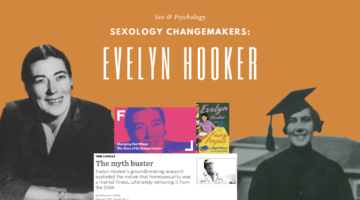Do Asexual People Masturbate And Have Sexual Fantasies?
January 31, 2015 by Justin Lehmiller
Asexuality is a sexual orientation that is often characterized as a lack of sexual attraction. Research suggests that up to 1% of the population may be asexual and, further, that this is not the result of a medical issue, sexual arousal problem, or fear of sex. Although we do not yet know the true origin of asexuality, research suggests that biological factors are likely involved. Given the nature of asexuality, one might reasonably assume that asexuals neither masturbate nor have sexual fantasies; however, a new study published in The Canadian Journal of Human Sexuality suggests that this is not necessarily the case and that there are no hard-and-fast rules when it comes to the solitary sexual expression of asexual individuals.
In this study, researchers at the University of British Columbia conducted an online survey in which they recruited both sexual and asexual participants to complete a survey about their masturbation habits and sexual frequency. The sexual sample consisted of 187 individuals (average age of 31) who self-identified as either gay, straight, or bisexual and who also reported having no problems or issues with sexual desire. The asexual sample consisted of 534 individuals (average age of 24) who self-identified as asexual. (Note: The researchers also collected data from sexual individuals who reported low sexual desire, as well as sexual individuals who met criteria for hypoactive sexual desire disorder. Please see the original research article for information on their pattern of results.)
The findings of this research are sure to be surprising to many. First, more than half (56%) of asexual participants reported that they masturbate at least monthly, compared to 82% of sexual participants. Thus, asexuals are certainly less likely to masturbate overall, but it still appears to be a relatively common practice among them.
Likewise, 60% of asexuals reported having had sexual fantasies before, compared to 98% of sexual participants. Again, while asexuals are certainly less likely to have sexual fantasies, it is not uncommon for asexuals to report them. It is also worth noting that most asexuals who fantasized said that other people appeared in their fantasies—just 11% of asexuals reported that their fantasies did not involve anyone else (compared to 0.5% of sexual participants who said the same thing).
In total, 20% of the asexual sample reported no masturbation or sexual fantasies, 19% masturbated but did not have fantasies, 11% had fantasies but did not masturbate, and 50% both masturbated and had fantasies.
These findings reveal that masturbation and sexual fantasy are indeed less common among asexuals than they are among sexuals; however, it appears that a sizeable percentage of asexuals still masturbate, have sexual fantasies, or both.
These fascinating results raise a lot of questions for future research because they suggest that masturbation and sexual fantasy may be qualitatively different among asexuals. For instance, when you consider the fact that some asexuals masturbate but don’t fantasize, this suggests that masturbation may be a “non-directed” activity among such individuals (in contrast to sexual folks, who often masturbate to very specific erotic imagery). Also, what does it mean when someone who is asexual fantasizes about sexual acts involving other people? Are asexuals less connected to the content of their sexual fantasies, or are they perhaps less likely to have fantasies in which they themselves are actively involved in the activity)? (You can actually help us to answer this question by clicking here and participating in a new survey of sexual fantasies!)
Although more research on this topic is needed, these findings challenge some commonly held assumptions and reveal that asexuality does not necessarily mean a lack of all sexual expression.
Want to learn more about Sex and Psychology? Click here for previous articles or follow the blog on Facebook (facebook.com/psychologyofsex), Twitter (@JustinLehmiller), or Reddit (reddit.com/r/psychologyofsex) to receive updates.
To learn more about this research, see: Yule, M. A., Brotto, L. A., & Gorzalka, B. B. (2014). Sexual fantasy and masturbation among asexual individuals. The Canadian Journal of Human Sexuality, 23(2), 89-95.
Image Source: Wikimedia Commons

Dr. Justin Lehmiller
Founder & Owner of Sex and PsychologyDr. Justin Lehmiller is a social psychologist and Research Fellow at The Kinsey Institute. He runs the Sex and Psychology blog and podcast and is author of the popular book Tell Me What You Want. Dr. Lehmiller is an award-winning educator, and a prolific researcher who has published more than 50 academic works.
Read full bio >


